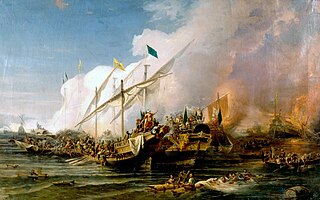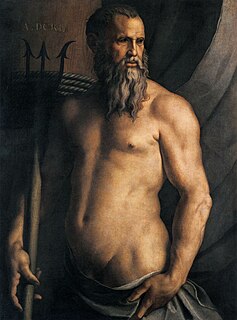Related Research Articles

The Battle of Preveza was a naval battle that took place on 28 September 1538 near Preveza in northwestern Greece between an Ottoman fleet and that of a Christian alliance assembled by Pope Paul III in which the Ottoman fleet defeated the allies. It occurred in the same area in the Ionian Sea as the Battle of Actium, 31 BC. It was one of the three largest sea battles that took place in the sixteenth century Mediterranean, along with the Battle of Djerba and the Battle of Lepanto.

Andrea Doria was a Genoese statesman, condottiero and admiral, playing a key role in the Republic of Genoa during his lifetime.

The Republic of Genoa was an independent state and maritime republic from the 11th century to 1797 in Liguria on the northwestern Italian coast, incorporating Corsica from 1347 to 1768, and numerous other territories throughout the Mediterranean and the Black Sea.

Doria originally de Auria, meaning "the sons of Auria", and then de Oria or d'Oria, is the name of an old and extremely wealthy Genoese family who played a major role in the history of the Republic of Genoa and in Italy, from the 12th century to the 16th century. Numerous members of the dynasty ruled the republic first as Capitano del popolo and later as Doge.
The Battle of Chioggia was a naval battle during the War of Chioggia that culminated on June 24, 1380 in the lagoon off Chioggia, Italy, between the Venetian and the Genoese fleets. The Genoese, commanded by Admiral Pietro Doria, had captured the little fishing port in August the preceding year.

Giovanni Luigi Fieschi or Fiesco was a Genoese nobleman, count of Lavagna. He is the subject of the play Fiesco by Friedrich Schiller.

The Battle of Meloria was fought near the islet of Meloria in the Ligurian Sea on 5 and 6 August 1284 between the fleets of the Republics of Genoa and Pisa as part of the Genoese-Pisan War. The victory of Genoa and the destruction of the Pisan fleet marked the decline of the Republic of Pisa.

Hayreddin Barbarossa, also known as Hızır Hayrettin Pasha, and simply Hızır Reis , was an Ottoman corsair and later admiral of the Ottoman Navy. Barbarossa's naval victories secured Ottoman dominance over the Mediterranean during the mid 16th century.

Giovanni Andrea Doria, also known as Gianandrea Doria, (1539–1606), was an Italian admiral from Genoa.
The Holy League of 1538 was a short-lived alliance of Christian states arranged by Pope Paul III at the urging of the Republic of Venice.

The House of Spinola, or Spinola family, was a leading Italian political family centered in the Republic of Genoa. Their influence was at its greatest extent in the thirteenth and fourteenth centuries.

The Invasion of Corsica of 1553 occurred when French, Ottoman, and Corsican exile forces combined to capture the island of Corsica from the Republic of Genoa.

The Battle of Ponza (1552) was a naval battle that occurred near the Italian island of Ponza. The battle was fought between a Franco-Ottoman fleet under Dragut and a Genoese fleet commanded by Andrea Doria. The Genoese were defeated and lost seven galleys captured. The battle made it easier for the Ottoman fleet to raid the coasts of Sicily, Sardinia, and Italy for the next three years.

Oberto D'Oria was an Italian politician and admiral of the Republic of Genoa, ruling the republic as Capitano del popolo.

The capture of Mahdia was an amphibious military operation that took place from June to September, 1550, during the struggle between the Ottoman Empire and the Spanish Habsburgs for the control of the Mediterranean. A Spanish naval expedition under the command of the Genoese condottiero and admiral Andrea Doria and the Spaniard Bernardino de Mendoza, supported by the Knights of Malta under their Grand Master Claude de la Sengle, besieged and captured the Ottoman stronghold of Mahdia or Mahdiye, defended by the Ottoman Admiral Turgut Reis, known as Dragut, who was using the place as a base for his piratical activities throughout the Spanish and Italian coasts. Mahdia was abandoned by Spain three years later, and all its fortifications were demolished to avoid a re-occupation of the city by the Ottomans.

Dragut, known as "The Drawn Sword of Islam", was a Muslim Ottoman naval commander, governor, and noble, of Turkish or Greek descent. Under his command, the Ottoman Empire's maritime power was extended across North Africa. Recognized for his military genius, and as being among "the most dangerous" of corsairs, Dragut has been referred to as "the greatest pirate warrior of all time", "undoubtedly the most able of all the Turkish leaders", and "the uncrowned king of the Mediterranean". He was described by a French admiral as "A living chart of the Mediterranean, skillful enough on land to be compared to the finest generals of the time. No one was more worthy than he to bear the name of king".
Paganino Doria was an Italian admiral from the prominent Genoese Doria family. He was the victorious head of the Genoese naval forces in the conflict between the Republic of Genoa to Venice in the middle of the 14th century.

The Portrait of Andrea Doria as Neptune is an oil painting on canvas completed by Bronzino for a private collection in either the 1530s or 1540s. It is now in the Pinacoteca di Brera in Milan, Italy. An oil painting on canvas, it measures 199.5 centimetres (78.5 in) by 149 centimetres (59 in). In a conscious revival of the convention in classical sculpture of showing important political figures in heroic nudity, it depicts the Genoan admiral, Andrea Doria, posing as the classical god of the sea, Neptune.

The Battle of Girolata was a naval action fought between Genoese, Spanish, and Ottoman ships on 15 June 1540 in the Gulf of Girolata, on the west coast of the island of Corsica, amidst the war between Charles V, Holy Roman Emperor and Suleiman the Magnificent. A Spanish squadron of 21 galleys led by the Genoese Gianettino Doria and the Spaniard Berenguer de Requesens surprised an Ottoman squadron of 11 galleys, anchored at Girolata, led by the Ottoman admiral Dragut, whom the commander of the Ottoman Navy, Hayreddin Barbarossa, had committed to raid the Italian coast after his victories in the Adriatic sea the year before. As the crews of the Ottoman warships were ashore, distributing the booty from recent raids, the Spanish-Genoese fleet easily overtook them, taking all 11 Ottoman galleys and making 1,200 prisoners, among them Dragut, who was carried to Genoa and put, together with his captains, to row in Andrea Doria's galleys.

The Genoese Navy, also known as the Genoese Fleet, was the naval contingent of the Republic of Genoa's military. From the 11th century onward the Genoese navy protected the interests of the republic and projected its power throughout the Mediterranean Sea. It played a crucial role in the history of the republic as a thalassocracy and a maritime trading power.
References
- "Doria Family". (2008). In Encyclopædia Britannica . Retrieved 23 June 2008, from Encyclopædia Britannica Online: http://www.britannica.com/eb/article-9030968